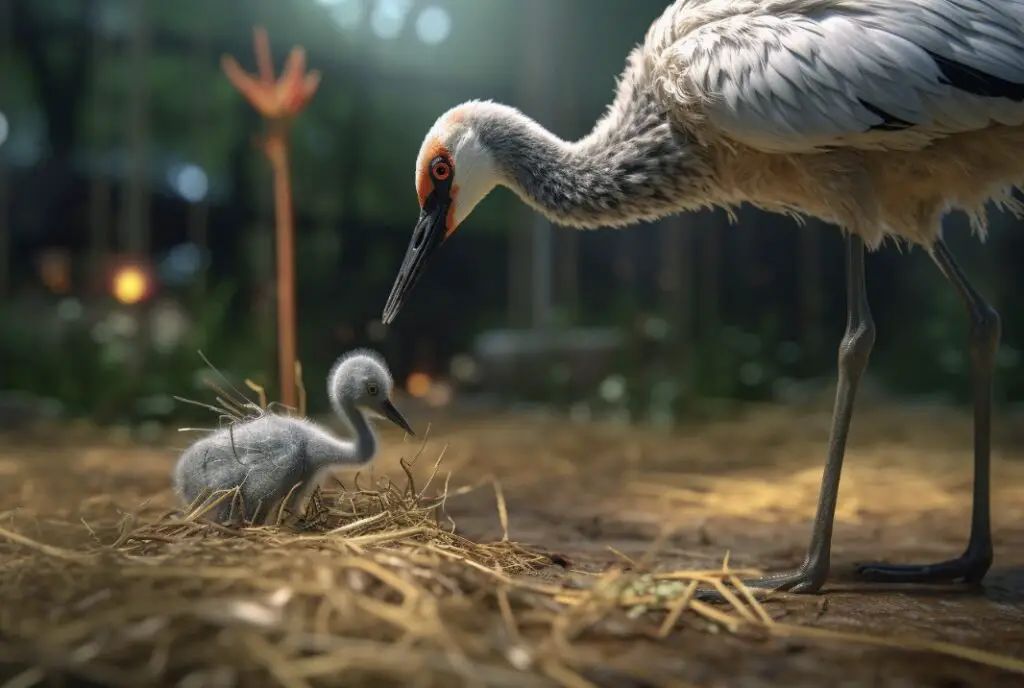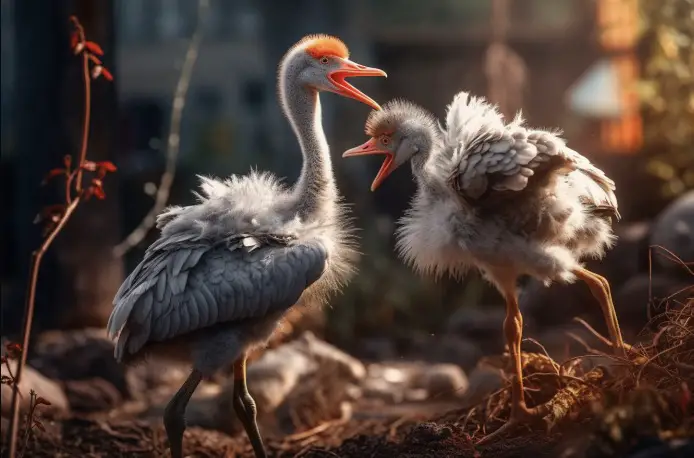As a biologist, I have spent countless hours observing and studying the fascinating world of birds.
One question that has piqued my curiosity is:why do cranes kill their young?
This seemingly bizarre and counterproductive behavior is, in fact, a well-documented phenomenon in the crane world, and it has a basis in evolutionary biology.
In this blog post, I will explore the reasons behind this behavior, drawing upon my personal experiences as well as scientific research to shed light on the matter.
The Basics: Understanding Crane Parenting
Before delving into the reasons for this behavior, it’s essential to understand the basic structure of crane parenting. Cranes are known for being attentive and caring parents.

They mate for life and work together to raise their young, known as colts, in a process that lasts about 9-10 months. The parents take turns incubating the eggs and fiercely protect their nest from predators.
Sibling Rivalry: A Common Theme in the Animal Kingdom
Sibling rivalry is a common occurrence in the animal kingdom, and cranes are no exception. This competition can manifest itself in various ways, including fighting over food, attention, and resources. In some cases, this rivalry can escalate to the point where one sibling kills the other – a phenomenon known as siblicide.
The same tendencies are seen in storks that also sometimes get rid of the weakest young on purpose.
The Principle of Siblicide: Survival of the Fittest
The driving force behind siblicide in cranes is the concept of survival of the fittest. The harsh reality is that resources are limited, and not all offspring will be able to survive and reproduce.

Therefore, by killing their sibling, the surviving colt increases their chances of survival and ultimately passing on their genes. This ruthless strategy has been observed in other bird species, such as eagles and pelicans, as well as some mammals, like lions and hyenas.
The Role of Parents: Facilitators of Siblicide
Interestingly, crane parents often facilitate siblicide by favoring the stronger or more dominant colt. This favoritism may be demonstrated through preferential feeding or by not intervening when the siblings engage in aggressive behavior.
This seemingly cruel behavior is driven by the fact that the parents’ ultimate goal is to produce strong offspring capable of surviving and reproducing.
My Personal Observations: Witnessing Siblicide in Action
During my time in the field, I have personally witnessed siblicide among crane siblings. It is a heart-wrenching experience to watch one colt kill its sibling, but it is a stark reminder of the harsh realities of nature.

The competition for survival is fierce, and only the strongest and most adaptable will endure.
The Exception: Instances of Sibling Cooperation
While siblicide is a common occurrence in the crane world, it is not universal. In some cases, crane siblings will cooperate and work together to ensure their mutual survival. This cooperative behavior is more likely to occur when resources are plentiful and the benefits of working together outweigh the advantages of eliminating a competitor.
The Bigger Picture: Siblicide as an Evolutionary Strategy
The prevalence of siblicide among cranes and other species speaks to the power of natural selection in shaping behavior. While it may seem counterintuitive for an organism to kill its own kin, this strategy has evolved because it ultimately increases the chances of an individual’s genes being passed on to the next generation. As a result, siblicide persists as a common feature in the animal kingdom.
Human Implications: A Lesson in Perspective
As humans, we often view the world through the lens of our own emotions and moral compass. However, when studying the behavior of cranes and other animals, it’s important to remember that these creatures are driven by evolutionary imperatives rather than human-like sentiments.
By understanding the motivation behind behaviors like siblicide, we can gain a deeper appreciation for the complex and often brutal world of nature.
Conclusion: The Harsh Reality of Siblicide in Cranes
In conclusion, cranes kill their young due to a combination of sibling rivalry, limited resources, and the principle of survival of the fittest.
This behavior, known as siblicide, is a common evolutionary strategy seen in birds and other animals that ultimately increases an individual’s chances of passing on their genes.
While it may be difficult for us to comprehend or accept, it is a reminder of the powerful forces that shape the natural world.
To summarize, here are 10 facts about crane siblicide:
1. Cranes are known for being attentive and caring parents.
2. Sibling rivalry is common among crane colts.
3. Siblicide is a result of competition for limited resources.
4. The principle of survival of the fittest drives siblicide.
5. Crane parents may facilitate siblicide by favoring the stronger colt.
6. Siblicide is common among other bird species and some mammals.
7. Sibling cooperation can occur in cranes when resources are plentiful.
8. Siblicide is an evolutionary strategy that increases an individual’s chance of passing on their genes.
9. Studying siblicide can provide insights into the power of natural selection.
10. Understanding siblicide requires a perspective that goes beyond human emotions and morality.
FAQs
Why do mother storks throw their babies away?
Mother storks do not throw their babies away. This is a myth and has no scientific basis. Storks are known for their strong parental instincts and take great care of their young.
Why do mother birds throw their babies out of the nest?
Mother birds do not intentionally throw their babies out of the nest. However, some species of birds, such as cuckoos, lay their eggs in the nests of other bird species, and the young cuckoo will push the other eggs or chicks out of the nest to ensure that it receives all of the food and attention from the adoptive parents.
Why do storks kill their offspring?
Storks do not intentionally kill their offspring. In rare cases, accidental deaths may occur due to a lack of experience or parental mistakes, but this is not common behavior for storks.
Do birds ever kill their young?
Yes, some bird species may kill their young for various reasons such as competition for resources, genetic defects, or to protect the rest of the brood. However, this behavior is not common among most bird species.
Do storks kill their offspring?
No, storks do not kill their offspring. In fact, storks are known for being very protective and nurturing parents.
What bird kills its young?
There is no bird species that commonly kills its own young. However, some species may exhibit infanticide under certain circumstances, such as when resources are scarce or when a male takes over a new territory and kills the offspring of the previous male.




